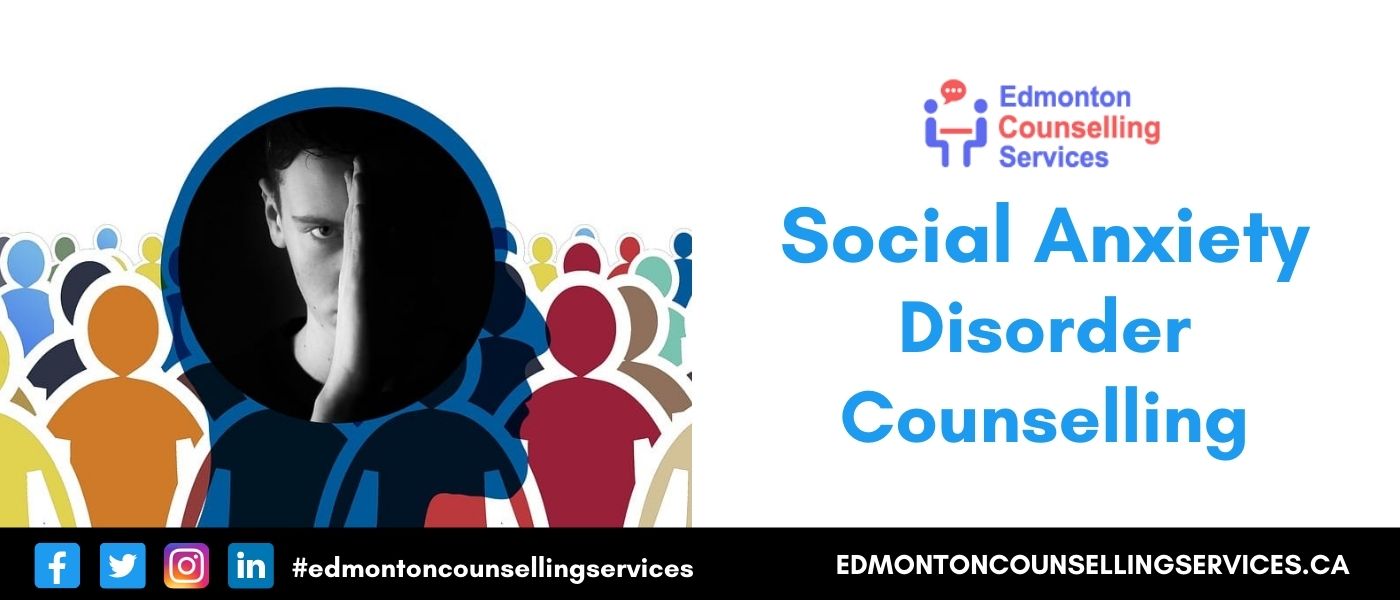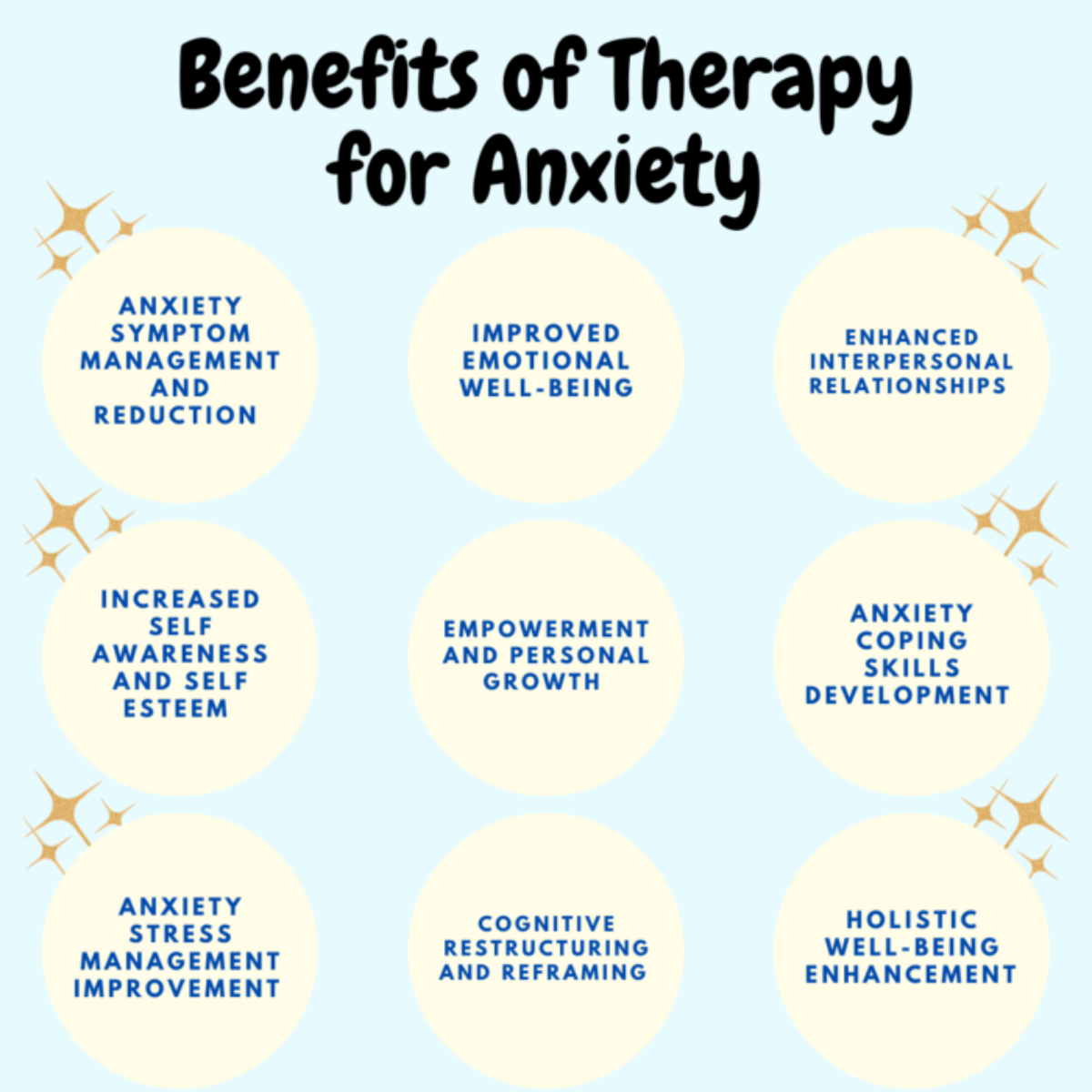Scientifically supported counselling for anxiety with caring guidance
Scientifically supported counselling for anxiety with caring guidance
Blog Article
Exploring Different Methods in Therapy for Anxiousness Problem for Lasting Change
When dealing with stress and anxiety problems, it's important to check out a range of counseling methods. Each method provides distinct insights and devices to aid you handle your signs and symptoms properly. You could discover that integrating methods can yield the best outcomes. Nonetheless, recognizing the subtleties of these techniques is essential to fostering lasting change. What if the right combination could launch a new level of emotional health for you?
Recognizing Anxiousness Problems: A Quick Summary
Anxiety problems, which influence millions of people worldwide, can considerably affect day-to-day life. You may experience frustrating feelings of worry or worry that appear unmanageable. These feelings can bring about physical signs and symptoms like a racing heart, sweating, or perhaps lightheadedness. Common kinds of anxiety problems include generalised stress and anxiety disorder, panic disorder, and social anxiety problem. Each has distinct indicators, however they all share a propensity to disrupt your regular and relationships.Understanding the root creates of your stress and anxiety is vital. It may stem from genes, mind chemistry, or life experiences. Acknowledging your triggers can aid you manage your feedbacks better. It is essential to bear in mind that you're not alone in this struggle. Many individuals encounter comparable difficulties, and seeking help is a strong action toward feeling much better. By learning more about anxiety conditions, you're currently on the course to understanding and managing your problem extra successfully.
Cognitive-Behavioral Treatment: Challenging Unfavorable Thought Patterns
In Cognitive-Behavioral Therapy, you'll begin by recognizing the negative thought causes that add to your anxiety. When you acknowledge these ideas, you'll service changing them with even more favorable choices. With each other, you'll build effective coping strategies to aid handle your anxiety in everyday situations.
Identifying Negative Thought Triggers

Recognizing the specific triggers behind your adverse ideas can be necessary in taking care of stress and anxiety when you come across moments of distress. Start by taking notice of scenarios that prompt sensations of fear or anxiety. Is it a jampacked space, a forthcoming target date, or a conversation with certain individuals? Write down these circumstances in a journal. This will help you identify patterns in your thinking. Additionally, notice physical feelings that accompany your unfavorable ideas, like an auto racing heart or rigidity in your breast. By determining these triggers, you get insight right into what's fueling your anxiety. Recognizing these connections is the primary step in challenging those ideas and ultimately regaining control over your psychological responses.
Changing Thoughts With Positives
Testing negative thought patterns is an essential action in changing your attitude and decreasing stress and anxiety. You might commonly locate yourself caught in cycles of insecurity or catastrophic thinking. As opposed to allowing these thoughts determine your feelings, practice changing them with favorable affirmations or realistic options. When you assume, "I can't handle this," change it to, "I can manage difficulties one action at a time." This simple modification can greatly affect your emotion. Regularly determining and responding to these negative thoughts aids create a healthier interior discussion. Remember, it takes time and effort, but constantly exercising this method can cause enduring modification, equipping you to deal with anxiety with renewed confidence and resilience.
Structure Coping Approaches Together
Changing adverse ideas is only the beginning of managing anxiousness properly. To develop enduring change, you require to construct coping methods that equip you. Cognitive-Behavioral Therapy (CBT) aids you determine and challenge those purposeless idea patterns. Together, you and your counselor can discover exactly how these thoughts impact your sensations and behaviors.Start by establishing useful techniques, like journaling or mindfulness exercises, that allow you to confront anxiety head-on. When you encounter your concerns slowly, you'll learn to react in different ways.

Mindfulness and Acceptance-Based Approaches: Cultivating Present-Moment Awareness
As you browse the complexities of anxiety, including mindfulness and acceptance-based techniques can considerably improve your capacity to cultivate present-moment understanding. By concentrating on the here and now, you'll discover that you can observe your ideas and feelings without judgment (Counseling services for anxiety). This method aids you acknowledge your stress and anxiety without really feeling bewildered by it.Engaging in mindfulness workouts, such as deep breathing, body scans, or directed meditations, enables you to ground on your own in your current experience. Acceptance-based techniques motivate you to welcome your feelings as opposed to deal with versus them. They shed their power over you.Incorporating these techniques right into your daily routine can change just how you react to stress and anxiety when you accept your sensations. You'll create resilience and learn to navigate stressful circumstances with higher simplicity. Eventually, cultivating present-moment recognition lays the structure for lasting change, empowering you to lead a more fulfilling visit their website life
Exposure Therapy: Confronting Fears Gradually
Direct exposure treatment assists you face your concerns in a steady means, making it much less frustrating. You'll find out strategies to face anxiety-provoking situations detailed, while also building coping techniques to handle your reactions. This method equips you to take control and reduce anxiousness in time.
Progressive Exposure Methods

When encountering stress and anxiety, gradually facing your fears can be an effective method to reclaim control. This technique, known as steady exposure, includes slowly subjecting yourself to the circumstances or things that cause your anxiety. Begin with less daunting scenarios and gradually work your means as much as even more difficult ones. If you're scared of public speaking, you could start by talking in front of a mirror, after that proceed to sharing ideas with a good friend, and ultimately resolve a tiny group. Each step aids desensitize you to the anxiety, building your self-confidence with time. Remember, it's necessary to speed on your own and commemorate small success as you relocate via this process, strengthening your capability to handle anxiousness efficiently.
Structure Coping Methods
Structure reliable coping approaches is important for handling stress and anxiety, particularly as you face your concerns slowly - Counseling services for anxiety. One effective technique is exposure therapy, where you start by facing your fears in a controlled manner. Begin with less frightening scenarios and gradually function your method as much as more challenging circumstances. This steady direct exposure assists desensitize you to stress and anxiety sets off, making them less overwhelming.Incorporate relaxation strategies, such as deep breathing or mindfulness, to relax your mind throughout exposure. Track your progress, commemorating tiny success along the method to increase your self-confidence. Bear in mind, it's all right to take your time; the objective isn't perfection but constant renovation. By developing these methods, you'll encourage on your own to navigate stress and anxiety and embrace life more fully
Psychodynamic Therapy: Revealing Origin of Stress And Anxiety
Psychodynamic therapy explores the unconscious mind, disclosing the source of your anxiety. By examining your ideas, sensations, and previous experiences, this strategy helps you uncover underlying conflicts and unsolved issues that may add to your present anxiousness. You'll function with a therapist to examine childhood experiences, partnerships, and emotional patterns that form your reactions today.As you obtain insight right into these deeper layers of your subconscious, you'll start to identify how previous events influence your existing behavior. This understanding can bring about catharsis, allowing you to refine feelings you could have suppressed.Through the therapeutic connection, you can also determine defense reaction that might have developed in time, supplying a clearer course to change. Eventually, psychodynamic treatment equips you with the devices to resolve your stress and anxiety at its core, advertising lasting transformation in your psychological well-being.
Integrative and All Natural Techniques: Integrating Methods for Greater Efficiency
Integrating numerous therapeutic methods can enhance your trip towards managing anxiety better. By integrating aspects from cognitive-behavioral treatment, mindfulness techniques, and all natural approaches, you can create an individualized approach that resolves your unique requirements. For circumstances, you could make use of cognitive-behavioral techniques to challenge unfavorable idea patterns while including mindfulness exercises to ground yourself in the existing moment.Additionally, discovering all natural methods such as yoga exercise or reflection can advertise leisure and lower anxiety symptoms. This mix permits you to establish higher self-awareness and resilience.Experimenting with these diverse approaches can aid you find what resonates most with you. Remember, it's concerning locating a synergy that works, instead than staying with a single approach. This integrative approach not only offers prompt alleviation but additionally cultivates long-lasting skills for you can find out more taking care of stress and anxiety, empowering you to reclaim control over your life.
The Duty of Support Systems: Structure Durability Through Link
While it could appear that handling stress and anxiety is a solitary journey, having a strong support group can play a crucial duty in your strength. Bordering yourself with empathetic pals, family, or support system produces a secure room where you can openly share your experiences and feelings. When you connect with others, you advise yourself that you're not the only one in this struggle.These relationships supply support and can give functional coping methods that have benefited others. It's likewise an opportunity to acquire viewpoint; good friends can aid you see situations in a different way, lowering feelings of isolation.Moreover, emotional assistance cultivates a feeling of belonging, which can significantly ease anxiousness symptoms. By leaning on your support group, you can develop strength and take on challenges better. Bear in mind, reaching out for help is an indication of stamina, and it can make all the distinction in your trip toward managing stress and anxiety.
Often Asked Concerns
What Are the Typical Signs And Symptoms of Anxiety Disorders?
You may experience restlessness, tiredness, problem focusing, impatience, muscular tissue tension, and sleep disturbances. Physical symptoms can include fast heartbeat, sweating, and shivering. Identifying these indicators early can assist you look for ideal support and treatment.
The Length Of Time Does Therapy Commonly Last for Anxiousness Problems?
Treatment for anxiety conditions normally lasts anywhere from a few weeks to several months. It really depends on your specific needs, progress, and read this the techniques your specialist utilizes to assist you manage your anxiousness properly.
Can Drug Be Made Use Of Together With Therapy for Anxiety?
Yes, drug can definitely be made use of together with therapy for stress and anxiety. Integrating both methods frequently improves therapy efficiency, helping you take care of signs while exploring underlying concerns with counseling (Counseling services for anxiety). Constantly consult your doctor for individualized guidance
Are There Self-Help Approaches for Handling Anxiousness?
Yes, there are a number of self-help techniques for taking care of stress and anxiety. You can exercise mindfulness, engage in regular workout, maintain a well balanced diet plan, establish a regular, and use deep breathing techniques to help in reducing anxiety signs and symptoms properly.
Exactly how Do I Know if I Need Expert Help for Anxiousness?

Report this page